
July 18

1887 Birth: Vidkun Quisling—Norwegian politician and officer—commonly known as one of World War II's most infamous traitors. He held the office of Minister President of Norway from February 1, 1942, to the end of World War II, while the elected social democratic cabinet of Johan Nygaardsvold was exiled in London. Quisling was tried for high treason and executed by firing squad after the war.
1909 Birth: Andrei Gromyko, near Minsk, in Russia, in 1909. After studying agriculture and economics he became a research scientist at the Soviet Academy of Science. He later joined the diplomatic service and went to Washington during the Second World War.
In 1943 Gromyko was appointed as the Soviet ambassador in the United States. In this post he attended the conferences in Teheran, Yalta and Potsdam. After the war he was made the Soviet permanent delegate to the United Nations. He also served as ambassador to Britain (1952-53).
Gromyko became Foreign Minister in 1957. He held the post for 28 years and during this period was the main Soviet negotiator with the United States government.
Mikhail Gorbachev appointed Gromyko President of the Soviet Union in 1987. Andrei Gromyko died in 1989.

1915 World War I: Various:
List Regiment: Gefreiter Adolf Hitler's 16 Reserve Infantry Regiment continue to occupy a position at Fromelles—pictured above in a drawing by Hitler—on a level field with water channels, willow trees and willow stalks. In the distance towards the enemy lines lies an insignificant wood with barbed wire entanglements. Under the direction of their defense-minded commander, Lieutenant General Gustav Scanzoni von Lichtenfels, the regiment works ceaselessly day and night to further fortify their position at Fromelles while fighting off repeated assaults by the enemy. [For further details, Click here.]
The Second Battle of Isonzo begins: A series of battles on this river are fought during the year with no gain for the Italians and the loss of 280,000 men:
Running from 18 July-3 August 1915, in actuality the second Isonzo battle achieved little more than the first other than increased casualties: 60,000 on the Italian side, 45,000 Austro-Hungarian. The Italian Second and Third armies made a number of trivial gains in the Carso following two days of often hand to hand fighting from 18 July, but were unable to maintain forward position gains around Gorizia. Throughout the Isonzo battles Cadorna consistently persisted with a policy of massed frontal infantry attacks against well prepared defensive positions, despite clear evidence on the Western Front that such tactics were fruitless.
1916 World War I: List Regiment: Gefreiter Adolf Hitler endures trench warfare in Flanders (Artois) with 3 Company, 16 Reserve Infantry Regiment. [For further details, Click here.]
1917 World War I: List Regiment: Gefreiter Adolf Hitler's 16th RIR remain deployed for Phase 1 operations in Flanders, Belgium. [For further details, Click here.]
1918 World War I: Allies begin major counter-offensive in Second Battle of the Marne:
Three days after a German offensive near the Marne River in the Champagne region of France meets with failure, Allied forces launch a major counterattack on July 18, 1918, ending the Second Battle of the Marne and decisively turning the tide of the war toward an Allied victory . . . . The Allied attack, which began in the early morning hours of July 18, 1918, was carried out by 24 divisions of the French army, as well as troops from the United States, Britain and Italy, pressing forward in some 350 tanks against the German salient.
As Crown Prince Wilhelm, a commander of the German forces at the Marne, recalled of the events of July 18: "Without artillery preparation, simply following the sudden rolling barrage, supported by numerous deep-flying aircraft and with unprecedented masses of tanks, the enemy infantry—including a number of American divisions—unleashed the storm against the 9th and 7th Armies at 5:40 in the morning." The French 6th and 10th Armies led the infantry advance, pushing forward five miles on the first day of the offensive alone. Meanwhile, the French 5th and 9th Armies launched supplementary attacks to the west.
List Regiment (June 17-27):Gefreiter Adolf Hitler's 16th RIR spends a fourth day with the 23rd and First Guard divisions in the Marne valley. [For further details, Click here.]
1925 Mein Kampf (My Struggle): The first volume of Hitler's personal political testament, is published in Munich. The book is dedicated to Dietrich Eckart, and to the sixteen Nazis who died in the Munich Putsch of November 9, 1918. For further information, Click here.

1935 Ethiopia: Emperor Haile Selassie urges his countrymen to fight to the last man against the invading Italian army.
Haile Selassie ascended the throne in the era of polar exploration and slow communication. Africa's oldest nation was little more than a footnote to the great stories of the day —something that Americans and Brits read about in the pages of the National Geographic. Some people still called the country Abyssinia. In certain countries far beyond Ethiopia's borders, segregation and apartheid were long established and little questioned. Most other African "nations" were colonies. Even at home, slavery was technically still legal.
In such an era, words like "pan-Africanism" and "civil rights" were little more than esoteric philosophical notions entertained by an enlightened few. That a country as backward as Italy, whose widespread poverty prompted the emigration of millions, would seek to devour a nation like Ethiopia, was an irony too subtle to raise eyebrows outside the most sophisticated intellectual circles.
1936 Holocaust: The Nazi-controlled Danzig Senate nullifies the Free City's constitution, prohibits the Jewish method of slaughtering animals, and prevents Jews from renewing leases and business licenses.
1939 Holocaust: A public announcement is printed: "The German Society of Race-hygiene is to organize the Fourth International Congress of Eugenics in Vienna on 26-28 August 1940. The President of the Congress will be Professor Rodin.
1940 World War II: Various:
The RAF carries out a daylight raid on invasion barges at Rotterdam, and a night raid on the Krupp armaments works at Essen in the Ruhr.
During this time, the English public became involved in a way never before seen in warfare: live radio reports from the front. BBC broadcasters would broadcast live or recorded blow-by-blow reports of the fighting in the Channel, and the public was fascinated by the progress. This helped to unite the populace in a way the Nazis never imagined.
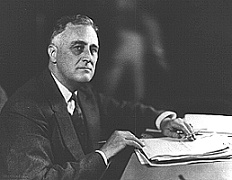
USA: The Democratic national convention in Chicago nominates President Franklin Roosevelt for a third term in office. FDR, a Democrat, broke with tradition and ran for a third term, which became a major issue. The surprise Republican candidate was maverick businessman Wendell Willkie, a dark horse who crusaded against Roosevelt's failure to end the Depression and eagerness for war. Roosevelt, aware of strong isolationist sentiment in the US, promised there would be no foreign wars if he were reelected.
1941 Holocaust: Various:
The first acknowledged reports concerning the mass killings of Jews in the East begin reaching England.
After the German army invaded the Soviet Union on June 22, 1941, a new stage in the Holocaust began. Under cover of war and confident of victory, the Germans turned from the forced emigration and imprisonment of Jews to mass murder. Special action squads, or Einsatzgruppen, made up of Nazi (SS) units and police, moved with speed on the heels of the advancing German army. Their job was to kill any Jews they could find in the occupied Soviet territory. Some residents of the occupied regions, mostly Ukrainians, Latvians, and Lithuanians, aided these German mobile killing squads.
Holocaust: A group of 30 White Russians who refuse to shovel earth over 45 Jews who had been tied together and thrown into a large pit are executed by the SS. All 75 are left dead in the pit. (THP)
1942 World War II: Various:
Stalin to FDR:

As regards the survey flight, we could in the next few days send a plane from Krasnoyarsk to Nome—I mean an American twin-engine aircraft—which could take on the US officers on its way back from Nome. I take this opportunity to thank you for the news about the dispatch of an additional hundred and fifteen tanks to the USSR. I consider it my duty to warn you that, according to our experts at the front, US tanks catch fire very easily when hit from behind or from the side by anti-tank rifle bullets. The reason is that the high-grade gasoline used forms inside the tank a thick layer of highly inflammable fumes. German tanks also use gasoline, but of a low grade which yields smaller quantities of fumes, hence, they are more fireproof. Our experts think that the diesel makes the best tank motor.
Case Blue: The advance by 6th Armee and 4th Panzerarmee toward the Don bend at Kalach continues:
The success of the initial advance of Sixth Army was such Hitler now ordered Fourth Panzer Army south to assist First Panzer Army in forcing a crossing of the lower Don river. This sudden redeployment of an entire Army caused massive logistical problems, as the road network in this part of USSR was not well developed by German standards. The resulting traffic jams caused delays to both Army Group A and B's progress. It also removed vital tank support from Sixth Army, slowing its advance and giving the Red Army further time to consolidate their positions.
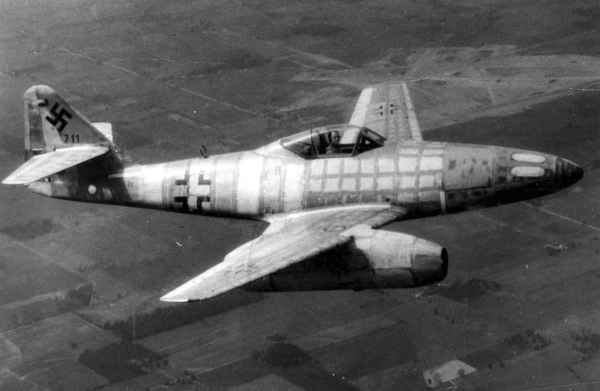
Aviation: Piloted by Fritz Wendel, the world’s first turbojet fighter aircraft, the Me 262, makes its first successful flight, near Guenzburg, Germany.
[See: Wunderwaffen: Hitler's Deception and the History of Rocketry.]Auschwitz: Himmler continues to inspect Auschwitz and the surrounding area with several officials from I.G. Farben:
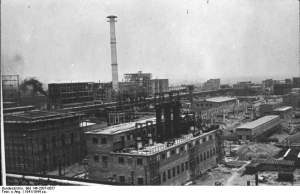
The Nazi occupation of Poland was to be brutal. They wanted to make the Poles a nation of slaves and it was to help them achieve this aim that the Nazis first built places like Auschwitz, modelled on concentration camps they'd already established in Germany. Hoess who had worked in concentration camps since 1934 knew that his task was to create a place that would strike terror into the Poles. But the gas chambers for which Auschwitz was to become infamous were not yet conceived.
Hoess even adopted the cynical motto of Dachau concentration camp in Germany "Arbeit Macht Frei" (Work makes you free) and emblazoned it on the new gates of Auschwitz. The Polish prisoners now arriving at the new camp were subject to appalling treatment from the SS. Over half the 23,000 Poles first sent to Auschwitz were dead within twenty months.
1943 World War II: Sicily: Attacks by the British Eighth Army (Montgomery) before Catania are stalled in the face of stiff German resistance.
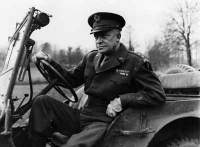
1944 World War II: Overlord: Eisenhower modifies his June 16, 1944 order (giving first priority to rocket sites) to include strikes against secondary-priority targets:
Instructions for continuing to make CROSSBOW targets are first priority must stand. But I think it would be well to issue an overall policy that, when we have favorable conditions over Germany and the entire strategic forces cannot be used against CROSSBOW, we should attack: (a) Aircraft industry, (b) Oil, (c) ball bearing [German: Kugellagerwerke], (d) Vehicular production. (Eisenhower II)
Overlord: The US First Army fights its way into the village of St.-Lo, France, ending the battle of the hedgerows:
The German army occupied the town on June 17, 1940. Being a strategic crossroads, Saint-Lo was almost totally destroyed (95% according to common estimates) during the Battle of Normandy in World War II, earning the title of "The Capital of the Ruins" from Samuel Beckett; it was even questioned whether to rebuild it or to leave the ruins intact as a testimony to the bombing.
Operation Goodwood begins as British and Canadian troops cross the Orne River at Caen and drive toward the south.
Operation Goodwood was an attack launched by the British army to the east of the city of Caen. British VIII Corps led the attack with three armoured divisions, supported by British I Corps on the eastern flank and the Canadian II Corps on the western flank, who were launching their own attack codenamed Operation Atlantic, to capture the remainder of Caen.
When Operation Goodwood ended on 20 July, the armoured divisions had broken through the initial German defences and had advanced 7 miles before coming to a halt in front of the Bourguebus Ridge, although armoured cars had penetrated further south and over the ridge.
There has been controversy since July 1944 over the objective of the operation: whether it was a limited attack to secure Caen and pin German formations in the eastern region of the Normandy beachhead, preventing them from disengaging to join the counterattack against the US Operation Cobra or a failed attempted breakout from the Normandy bridgehead. At least one historian has called the operation the largest tank battle that the British Army has ever fought.
Resistance: Dieter Bonhoeffer:

[His] importance begins with his opposition to the Nazi party and its influence in the German church during the rise of Hitler. This interest led him into areas of Christian ecumenical concerns that would later be important to the foundation of our contemporary ecumenical movements. Many denominational factions and various groups claim him as their spokesman, but it's his remarkable personal life, and his authorship of difficult devotional and academic works, which have gained him a place in the history of twentieth century theology.
Bonhoeffer was born on February 4, 1906 in Breslau, Germany (now part of Poland) and had a twin sister named Sabine. In 1933, before Hitler came to power, Bonhoeffer, a minister in the Lutheran church, was already attacking the Nazis in radio broadcasts. Two years later he was the leader of an underground seminary with over twenty young seminarians. That seminary is often seen as a kind of Protestant monastery, and is responsible for many of his considerations about the Christian life as it pertains to community. Later the seminary was closed by the Secret Police. In 1939, through arrangements made by Reinhold Niebuhr, he fled to the United States, but returned to Germany after a short stay. He believed it was necessary to suffer with his people if he was to be an effective minister after the war. The last two years of his life were spent in a Berlin prison. In 1945 he was executed for complicity in a plot on Hitler's life.
During the time that Bonhoeffer was in prison he wrote a book titled Letters and Papers from Prison. The manuscript was smuggled from jail and published. These letters contain Bonhoeffer's consideration of the secularization of the world and the departure from religion in the twentieth century. In Bonhoeffer's estimation, the dependence on organized religion had undermined genuine faith. Bonhoeffer would call for a new religionless Christianity free from individualism and metaphysical supernaturalism. God, argued Bonhoeffer, must be known in this world as he operates and interacts with man in daily life. The abstract God of philosophical and theological speculation is useless to the average man on the street, and they are the majority who needs to hear the gospel.
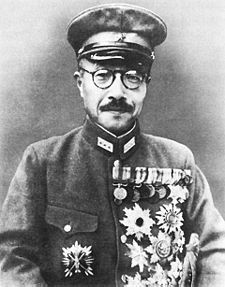
Hideki Tojo resigns as Japanese premier and war minister due to setbacks suffered by his country in war. He is succeeded by an Army General, Kuniaki Koiso.
1945 Charges of communists in the U.S. Army raised:
In testimony before the House Military Affairs subcommittee, the subcommittee's chief counsel, H. Ralph Burton, charges that 16 officers and non-commissioned officers in the U.S. Army have pasts that "reflect communism." The charges, issued nearly 10 years before Senator Joseph McCarthy would make similar accusations, were hotly denied by the U.S. Army and government.
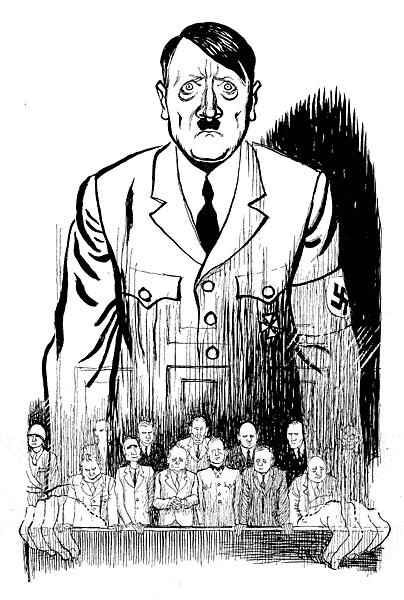
1946 Nuremberg Tribunal: Defense summations continue in the Major War Criminals Trial. One point in common with nearly all of the arguments of the various Defense Counsel is that there is a major absence among the Defendants; Adolf Hitler himself.
Dr. Sauter (Counsel for Defendant Baldur von Schirach):Since the Prosecution could not prove that the Defendant von Schirach had ever promoted Hitler's war policy before the war, he is being charged with having had various connections with the SS and SA, and especially with the fact that the SS, the SA, and the Leadership Corps of the Party obtained their recruits from the Hitler Youth. This last fact is quite correct, but it proves nothing as to Schirach's attitude toward Hitler's war policy and is equally pointless as regards the question of his participation in Hitler's war conspiracy. For since 90 or 95 percent or more of German youth belonged to the Hitler Youth movement it was only natural that the Party and its formations as the years went by should receive their young recruits in an ever-increasing measure from the Hitler Youth. Practically no other youth was available.
Dr. Servatius (Counsel for Defendant Fritz Sauckel):As a faithful follower of Hitler, the Defendant Sauckel remained isolated in the circle of the initiated. It is understandable that the extremists should have shunned him owing to his well-known opinions. He was not initiated into the secrets of people who aspired to be Hitler's friends and murderers at the same time, nor was he kept informed by the group of people who were Hitler's enemies, but who kept their knowledge secret with a novel kind of courage. A believer to the end, the Defendant Sauckel cannot to this day understand what has happened. Must he, like a heretic, recant his error in order to find mercy? He lacks the contact with reality, which would make understanding possible.
Does his sentence depend on his having unknowingly served a good or a bad cause? Nothing is either good or bad, but thinking makes it so. One thing, however, is always and under all circumstances good, and that is a good intention. This good intention was shown by the Defendant Sauckel. Therefore, I ask that he be acquitted.
The Prosecution has admitted that Jodl's participation in the conspiracy before 1933 could not be proved. In fact, anyone whose attitude toward the whole National Socialist movement was so full of distrust and who spoke with such skepticism about its seizure of power did not conspire to help Hitler take over the reins of Government. But the Prosecution seems to think that Jodl joined the alleged conspiracy in the period before 1939. In truth, during this time, too, nothing essential changed as far as he was concerned. True, his attitude toward Hitler was now an entirely loyal one. But it was Jodl's respected Field Marshal Von Hindenburg who had called Hitler into the Government, and the German people had confirmed this decision with more than 90 percent of its votes. Added to this was the feet that in Jodl's eyes-and not only in his-Hitler's authority was bound to rise by leaps and bounds in view of his remarkable- successes at home and abroad, which now followed one after another in quick succession; yet personally Jodl remained without any connection with Hitler. He did not participate in any of the big meetings at which Hitler developed his program. He had only read extracts of Hitler's book Mein Kampf, the bible of National Socialism. Jodl remained just an unpolitical man, quite in line with his personal inclinations, which were far removed from Party politics and in accordance with the traditions of the old family of officers from which he sprang. Of liberal leanings, he had little sympathy for National Socialism; as an officer he was forbidden to belong to the Party, and he had no right to vote or be politically active.
[For the full text of today's proceedings, Click here.]1947 Various:
Holocaust: SS Dr. Johann Paul Kremer's Auschwitz Testimony:
Particularly unpleasant was the gassing of the emaciated women from the women's camp, who were generally known as 'Muslims'. I remember I once took part in the gassing of one of these groups of women. I cannot say how big the group was.
When I got close to the bunker [I saw] them sitting on the ground. They were still clothed. As they were wearing worn-out camp clothing they were not left in the undressing hut but made to undress in the open air. I concluded from the behavior of these women that they had no doubt what fate awaited them, as they begged and pleaded to the SS men to spare them their lives. However, they were herded into the gas chambers and gassed. As an anatomist I have seen a lot of terrible things: I had had a lot of experience with dead bodies, and yet what I saw that day was like nothing I had ever seen before.
1947 Spandau Prison: The prisoners are finally moved to their permanent home at Spandau. Restrictions on mail are abolished. It had been expected that the seven surviving convicts would be sent to Spandau Prison in Berlin before the end of the year (1946), but for some reason there had been several delays, and the move is not made until more than nine months after the end of the trial. Colonel Andrus had departed, and his second in command, Major F. C. Teich, had taken over and somewhat loosened the reins. (Taylor)
From the Allied Control Commission's Spandau Prison Regulations:On admission, the prisoners will undress completely and their bodies will be carefully searched. The search, which will be in the presence of the Directorate, will be carried out by four warders. All parts of the body, including the anus, will be searched for articles which might be smuggled into the institution . . . .
The discipline of the institution requires that prisoners should adopt a standing position whenever approached or in the presence of prison officers. They will salute by standing at attention or by passing by them in an upright posture at the same time removing their headgear . . . . The prisoners may approach an officer or warder only if ordered to do so or if they wish to make a request . . . .
Prisoners will be . . . addressed by their convicts number; in no circumstances by name.
Imprisonment will be in the form of solitary confinement. The cells will be isolated, but work, religious services and walks in the open air will be carried out together. When awakened, the prisoner will rise immediately and make his bed. He will then strip to the waist, wash, brush his teeth and rinse his mouth. Clothing, shoes and the cell, including furniture, will be cleaned in the time provided for this purpose in the prescribed manner . . . . Approaching any window, including those in the cells, is strictly prohibited.
The prisoners may not talk or associate with one another nor with other persons except with special dispensation from the Directorate. They may not have in their possession any articles other than those authorized . . . . Work assigned by the Directorate will be carried out every day except Sundays and public holidays.
Edited by Levi Bookin (Copy editor) Click to join 3rdReichStudies Disclaimer: This site includes diverse and controversial materials—such as excerpts from the writings of racists and anti-Semites—so that its readers can learn the nature and extent of hate and anti-Semitic discourse. It is our sincere belief that only the informed citizen can prevail over the ignorance of Racialist "thought." Far from approving these writings, this site condemns racism in all of its forms and manifestations.
levi.bookin@gmail.com










Fair Use Notice: This site may contain copyrighted material the use of which has not always been specifically authorized by the copyright owner. We are making such material available in our efforts to advance understanding of historical, political, human rights, economic, democracy, scientific, environmental, and social justice issues, etc. We believe this constitutes a "fair use" of any such copyrighted material as provided for in section 107 of the US Copyright Law. In accordance with Title 17 U.S.C. Section 107, the material on this site is distributed without profit to those who have expressed a prior interest in receiving the included information for research and educational purposes. If you wish to use copyrighted material from this site for purposes of your own that go beyond 'fair use', you must obtain permission from the copyright owner.
Please Note: The list-owner and moderators of 3rdReichStudies are not responsible for, and do not necessarily approve of, the random ads placed on our pages by our web server. They are, unfortunately, the price one pays for a 'free' website.



